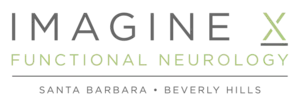Dizziness or Vertigo?
You've Come To The Right Place.
Watch This 3-Minute Video To Learn About Our Cutting-Edge, Drug-Free Dizziness/Vertigo Program!
To see if you are a candidate for the Imagine X Dizziness/Vertigo Program, please complete this Dizziness/Vertigo Qualification Questionnaire.
To schedule an appointment with Dr. Adam Harcourt, call 805-962-1988.
Want to Learn More? Keep Reading...
Vertigo, or dizziness, affects millions of people around the world each year.
Once your medical doctor has ruled out more serious conditions (such as vestibular neuronitis, labyrinthitis or fistulas), your dizziness/vertigo could be caused by the cerebellum or brain stem. There is something going on functionally with the way the brain interprets where you are in space. Dr. Harcourt will evaluate this and employ appropriate treatments.
Understanding Dizziness/Vertigo
In many cases, the area of dysfunction in the nervous system is the cerebellum. The cerebellum controls our coordinated movements.
There are specific neurological tests that Dr. Harcourt utilizes to determine cerebellar function. For instance, Romberg's, finger-to-nose and rapid alternating movement tests. These tests, and others, are used to determine the function of the cerebellum. Our goal is to use those tests to find out what we need to do to correct those symptoms.
Functional Dizziness/Vertigo
The brain stem is the integration point between the vestibular system and cerebellum. It controls many things, including heart rate, blood pressure, postural muscles, helps coordinate eye movements and intrinsic spinal muscles.
The vestibular system is a series of little canals in your ear that tell your brain when your head moves.
The cerebellum and brain stem work together to adapt to over-activation or under-activation by the vestibular system. When these systems are damaged or not working properly, the result is a miserable feeling of spinning, light-headedness and/or nausea. This functional dizziness/vertigo is what Dr. Harcourt specializes in treating. He is very knowledgeable about all types of dizziness, whether acute or chronic, and can treat and correct a myriad of dizziness symptoms.
What is BPPV?
In Benign Paroxysmal Positional Vertigo (BPPV), the little crystals (also referred to as "rocks" or "debris") in the ears overstimulate the canals of the vestibular system, so it thinks you're moving when you're not moving. Therefore, your brain stem and cerebellum have to adapt their function, so you don't feel like you are constantly dizzy. This is why you know you're not spinning, even though you feel like you are. Your eyes can see that you are stationary, but your vestibular system is telling your brain that you're spinning. This improper communication to the brain is what Dr. Harcourt evaluates and treats.
BPPV is a very common form of vertigo. It is most commonly found in the posterior canals, and can be helped with things like the Epley Maneuver. However, you can also get BPPV in the horizontal or anterior canals, which can cause similar symptoms. Dr. Harcourt will test for which canal is affected and can help using other maneuvers specific to the canals affected. This additional knowledge about vertigo and the other canals is very rarely known by most doctors, and is why Dr. Harcourt is so well known for helping so many "rare" vertigo cases.
For example, you may feel like you are constantly moving to the right, but you're not. Therefore, the cerebellum has to downplay how much it uses the input coming from the vestibular system. This overstimulation changes the way your brain works, and can cause chronic neck tightness, dizziness, balance issues, improper coordination, headaches, nausea, etc. If the cerebellum didn't make those adaptations, it would take years to recover, if ever. So the quicker you get dizziness/vertigo treated, the less adaptation takes place in the cerebellum. Therefore, the easier dizziness/vertigo is to correct. However, even if you've had vertigo for years, Dr. Harcourt knows how to correct the brain adaptation as well as the vertigo.
Treatments
When Dr. Harcourt does your initial examination, he will perform several vestibular and neurological tests to pinpoint what is causing the breakdown that allows your dizziness to occur. Additional testing such as balance and postural analysis, peripheral vision awareness testing and/or vestibular testing may be performed as well. Based on all of this data, Dr. Harcourt puts together a customized treatment plan. He will present a Report of Findings, which explains what he found at your exam, your treatment options, and estimated length of care. Treatments can include repositioning maneuvers, brain rehabilitation, customized vestibular rehabilitation, eye movement therapy, neuromuscular rehabilitation, non-invasive peripheral nerve stimulation, high-frequency vibratory therapy, and/or various manual therapies. He will also teach you customized at-home neurological therapies that you can do at your leisure. Many times he will even teach a spouse or close friend/family member a few simple positioning maneuvers you can have handy in case you have a flare-up during non-office hours or travel. Dr. Harcourt has created an extremely successful dizziness program. The results are amazing and patients are usually shocked at the progress they see within just 2-3 visits.
To see if you are a candidate for the Imagine X Dizziness/Vertigo Program, please complete this Dizziness/Vertigo Qualification Questionnaire.

